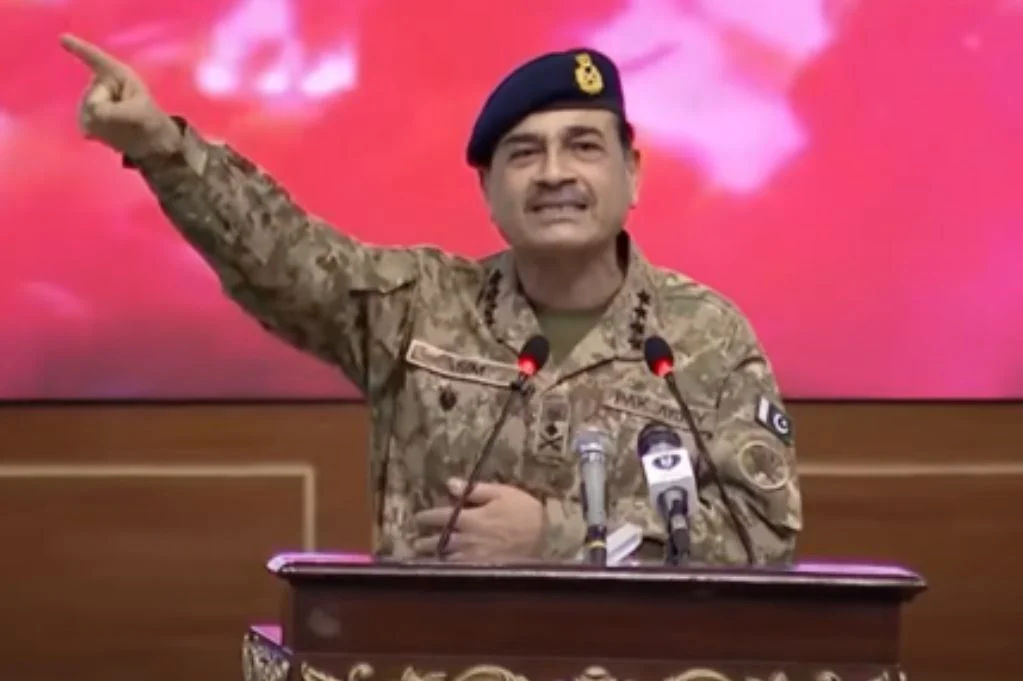
In a high-profile address at the Overseas Pakistani Convention in Islamabad, Pakistan’s Chief of Army Staff, General Asim Munir, strongly reaffirmed the Two-Nation Theory — a foundational ideology that led to the country’s creation in 1947. His remarks, which came as a call to Pakistanis living abroad to retain a deep connection with their homeland, have reignited political and academic debate across the region.
Speaking to a hall full of expatriate community members, General Munir emphasized the ideological distinctiveness between Muslims and Hindus that, according to him, justified the formation of Pakistan as a separate nation. “Our forefathers believed we were different from Hindus in every possible aspect of life — our religion, our customs, our traditions, our thoughts, our ambitions,” Munir said. “That’s where the foundation of the Two-Nation Theory was laid. We are two nations; we are not one nation.”
Passing the Torch to the Next Generation
In his emotionally charged message, Munir appealed to the diaspora to keep Pakistan’s origin story alive through future generations. He called on Pakistani families settled abroad to ensure their children and grandchildren understand the sacrifices that were made to establish the country.
Munir stressed that the country’s birth was not just a historical event but a result of immense struggle and loss. He urged that the spirit of those sacrifices must remain central to Pakistan’s identity, especially in the minds of younger Pakistanis who may be distanced by geography but still tied by heritage.
Revisiting a Historical Flashpoint
This is not the first time General Munir has evoked the Two-Nation Theory in public. In a previous address in August 2024 during Pakistan’s Independence Day celebrations, he sharply responded to criticisms of the theory. Referring to former Indian Prime Minister Indira Gandhi’s 1971 remark — that the Two-Nation Theory was “buried in the Bay of Bengal” following the creation of Bangladesh — Munir questioned, “Where are those today who had said we have drowned the Two-Nation Theory?”
In the same speech, he reaffirmed Pakistan’s firm stance on Jammu and Kashmir, calling it “an unfinished agenda of partition” and reiterating its centrality to Pakistan’s ideological framework.
Mixed Reactions Across the Political Landscape
General Munir’s comments have sparked significant debate. Many conservative voices have applauded the speech, saying it reaffirms Pakistan’s ideological roots and comes at a time when national unity is paramount. “The general is simply reminding us where we come from,” said a former government official. “Without ideology, nations lose direction.”
However, liberal scholars and commentators have raised concerns. Dr. Ayesha Jalal, a renowned historian specializing in South Asian politics, remarked, “The Two-Nation Theory played a pivotal role in the creation of Pakistan, but its continued relevance is increasingly questioned, especially by younger generations in a more interconnected and pluralistic world.”
Some fear that revisiting such divisive historical narratives could hinder reconciliation efforts and exacerbate tensions in an already volatile region.
Civil-Military Dynamics in Focus
General Munir’s speech has also raised eyebrows for its political undertones, especially as it comes from the military’s top leadership. Traditionally, outreach to overseas Pakistanis — a vital voting and fundraising bloc — has been a civilian domain. However, the military’s increasing engagement in such spheres may reflect a broader strategy to influence public opinion, particularly among the diaspora.
Analysts note that the military, which has long been a powerful institution in Pakistan, may be attempting to shape the national narrative more directly during a period of economic stress, political instability, and strained civil-military relations.
“This goes beyond patriotism,” said a political analyst in Karachi. “It reflects the army’s desire to play a central role in shaping the identity discourse both at home and abroad.”
Part of a Regional Nationalist Trend?
Munir’s speech can also be viewed in the context of rising nationalist sentiment across South Asia. In India, similar appeals to national identity and historical legacy are being made in political rhetoric. In this environment, historical concepts like the Two-Nation Theory are being revived to bolster domestic narratives, especially on issues like Kashmir and religious identity.
Some commentators argue that such rhetoric is a reaction to India’s growing global clout and the perception that Pakistan’s voice is increasingly marginalized. “Pakistan is trying to assert its ideological legitimacy on the world stage,” said a South Asia expert based in London. “But this approach could further entrench divisions.”
Looking Forward
As Pakistan continues to confront internal challenges — from economic reform and political uncertainty to regional tensions — its ideological bearings are once again being placed under the spotlight. General Munir’s comments highlight a push from the country’s military leadership to return to what it views as the foundational principles of the nation.
While it’s too early to assess the long-term impact of his speech, it has certainly reignited debate about what defines Pakistani identity today. Whether it strengthens a sense of unity among expatriates or reopens old wounds at home, the revival of the Two-Nation Theory by the army chief is a signal that ideology — and the way it’s communicated — will remain central to Pakistan’s national conversation.

















